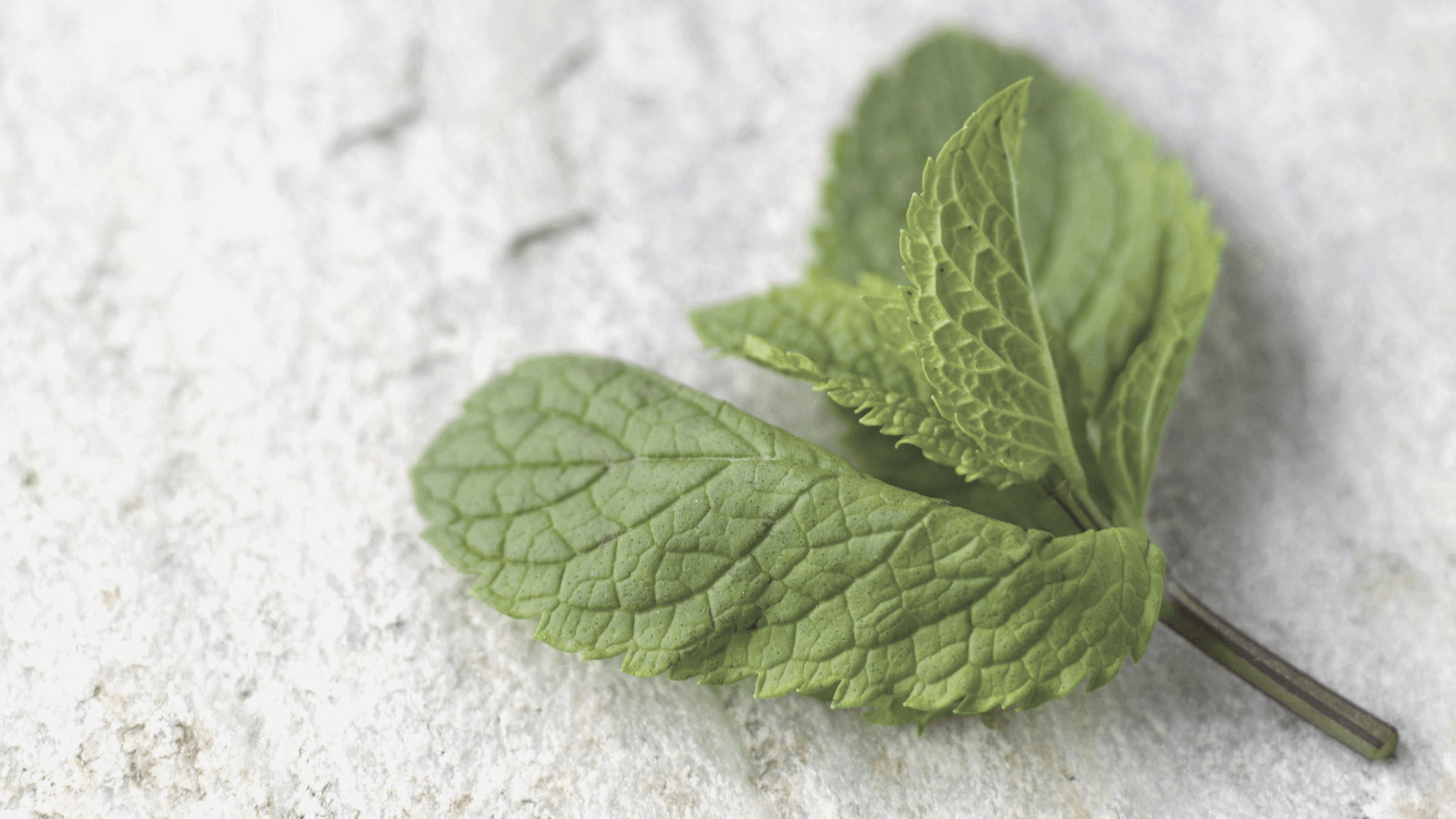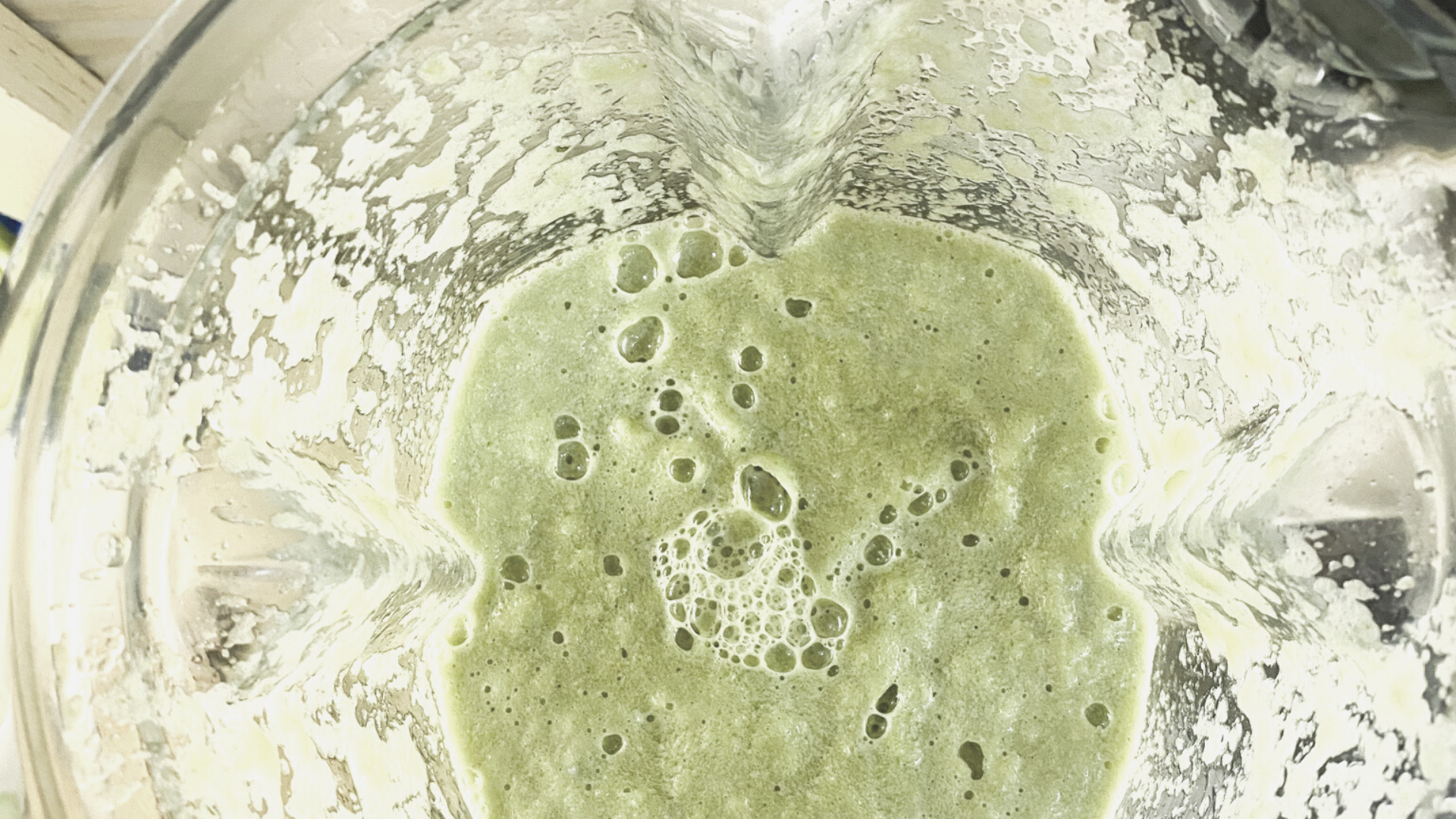Today we are going to be talking about one of my favorite topics, protein. And not just protein, but what the best protein powder for IBS is.
In fact, protein powder is one of my favorite go-to ways to get that extra protein boost throughout the day.
Let’s get right into it.
What is Protein and Why is It Important?
Protein is one of the three macronutrients that your body needs for energy. It contains a large amount of energy per serving and it is also has the highest thermic effect of all the macronutrients, meaning it takes the most energy to actually digest.
Protein has so many important functions throughout the body including:
- repairing damaged tissue and cells
- building enzymes that work in reactions throughout the body
- building hormones that regulate blood sugar
- carrying nutrients around the body
- making antibodies that fight viruses you have previously been exposed to
- acting as a third-tier energy reserve when carbohydrates and fats are not readily accessible
- regulating acid and base balance of the body
- regulating fluid balance in the body
As you can see protein is CRUCIAL for maintaining homeostasis in the body, or the balance of naturally existing conditions.
Protein regulates things such as fluid, acidity, and also makes up a large number of hormones that control functions across the entire body.
Getting enough protein is absolutely essential for the well-being of your entire body.
Source: HERE
How Much Protein Do I Need?
I’m not sure there is “an” answer to this one.
Depending on who you follow, what your goals are and what your current circumstances might be – those will all determine how you should calculate protein intake.
That being said, here are some ways you could approach it:
- Mayo Clinic states 10 – 35% of your calories should come from protein.
- The RDA (Recommended Dietary Allowance) is .8 grams of protein per kilogram of body weight, or .36 grams per pound.
- Many other studies indicate .7 – 1 gram per pound.
Regardless, even at the low end, many are not getting adequate amounts of protein.
This is where protein powder can come in.
Protein Powder
Protein powder is an extremely effective way to reach your protein needs for the day.
It can easily be added to almost any snack or meal, which makes it a very convenient source of protein. With each serving offering anywhere from 15-30 grams of protein, this is an easy choice to incorporate into your routine.
Here are some of my favorite snacks and meals to add my protein powder to:
- oatmeal
- smoothies
- baked goods
- yogurt
- waffles or pancakes
It can be super easy to incorporate this into most of your meals, which makes it such a great source of extra protein.
Types of Protein Powder
There are several different types of protein powder, each which has its own benefits and drawbacks.
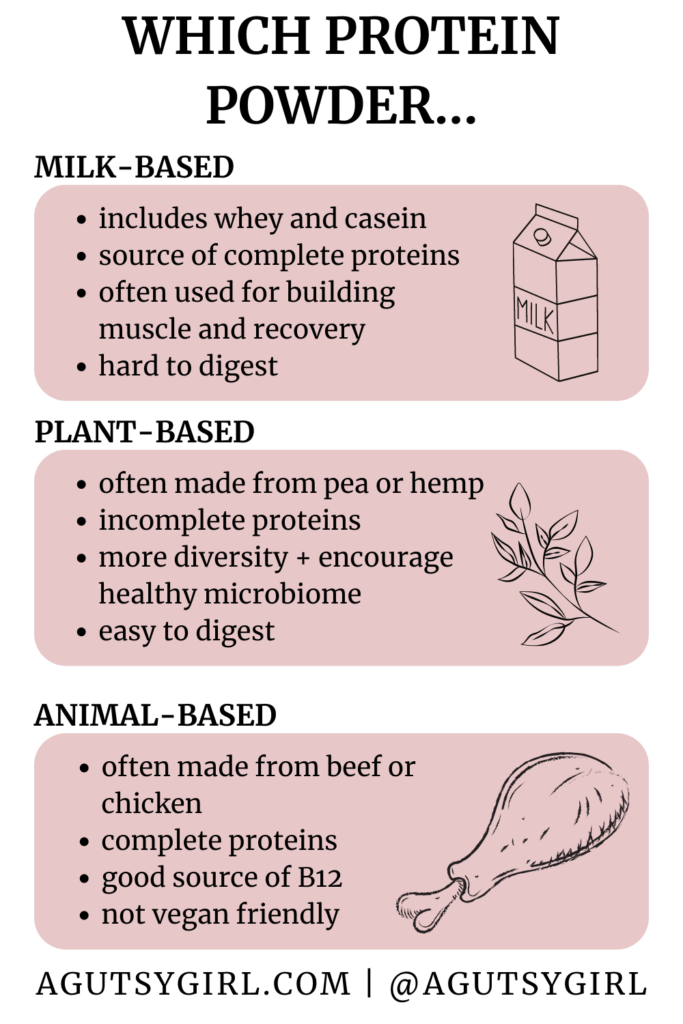
Milk-based protein powders (whey and casein)
Whey protein is absorbed faster than casein, which makes it a better option for workout needs. The body can quickly break it down and use this protein to build lean muscle.
Casein takes a longer time to absorb so it is often recommended for alternative use. Some people use this before bed or simply just on a more regular basis.
Both of these proteins are complete proteins, meaning they contain all the essential proteins your body needs. So with each of these types your body gets the full range of amino acids it needs to function.
PROS: complete proteins
CONS: milk-based, can be hard on the stomach for those with irritable bowel syndrome or lactose intolerance
Plant proteins
This category includes proteins like hemp and pea protein.
They are great for anyone with sensitive stomachs or who struggles specifically with dairy products. These proteins offer similar levels of proteins, however they sometimes can be incomplete.
Incomplete proteins do not contain all of the nine amino acids that our bodies need to get from our foods.
In order to compensate for this issue, make sure you are choosing high-quality plant proteins and supplementing the missing proteins if necessary.
PROS: easier on the stomach
CONS: can be incomplete and missing essential amino acids
Animal-based protein powders
Some protein powders are made using protein from beef or chicken, which is another great option for all my Gutsy girls.
These products are a source of complete protein, but they are often a bit more expensive.
Since they are animal products, they also are higher in B12, a vitamin that many Gutsy girls are deficient in. This can be an easy way to ensure you are meeting your micronutrient needs.
PROS: complete protein and source of B12
CONS: $$$$$ and not suitable for vegetarians or vegans
Source: HERE
The Issue with Most Protein Powders
The issue with protein powders comes down to their ingredients.
Protein powders are not well regulated and they often contain not only filler ingredients, but also metals.
The FDA does not regulate these products so it is up to the CONSUMER to make sure that you are buying from a reputable company.
Traces of metals in food can be extremely harmful to the body and cause all sort of issues down the road. To avoid this all together, do your research before investing in any type of protein powder.
In terms of filler ingredients, protein powders often contain excess sugars and ingredients that can be extremely hard on the body and digestive system.
This makes it very hard on all us Gutsy girls to find a protein powder that does not upset our stomachs.
Some examples to watch out for on the ingredient list include:
- dextrins/ maltodextrin – raise glycemic index and highly processed with GMO corn
- artificial sweeteners- disrupt the gut bacteria and encourage dysbiosis
- soy protein- normally highly processed and can disrupt natural hormone cycles
- vegetable oils- highly inflammatory
- thickeners and gums- extremely hard to digest and can cause constipation and digestive symptoms
These ingredients cause a whole host of side effects, as well as being taxing on the GI system.
With most protein powders containing products like these, it should come as no surprise that most of us can not tolerate them.
Common side effects / IBS symptoms include:
- bloating
- increased gas
- abdominal pain
- altered bowel movements
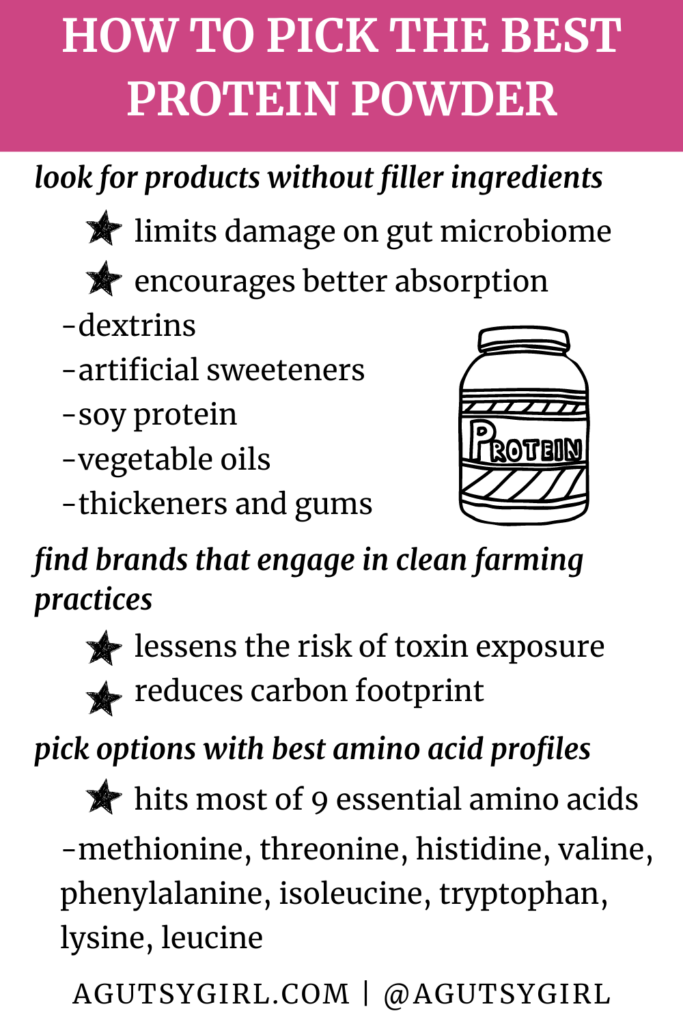
Best Protein Powder for IBS (Your Guide to Picking the Best Powders)
Click HERE to save this post on the best protein powder for IBS for later.
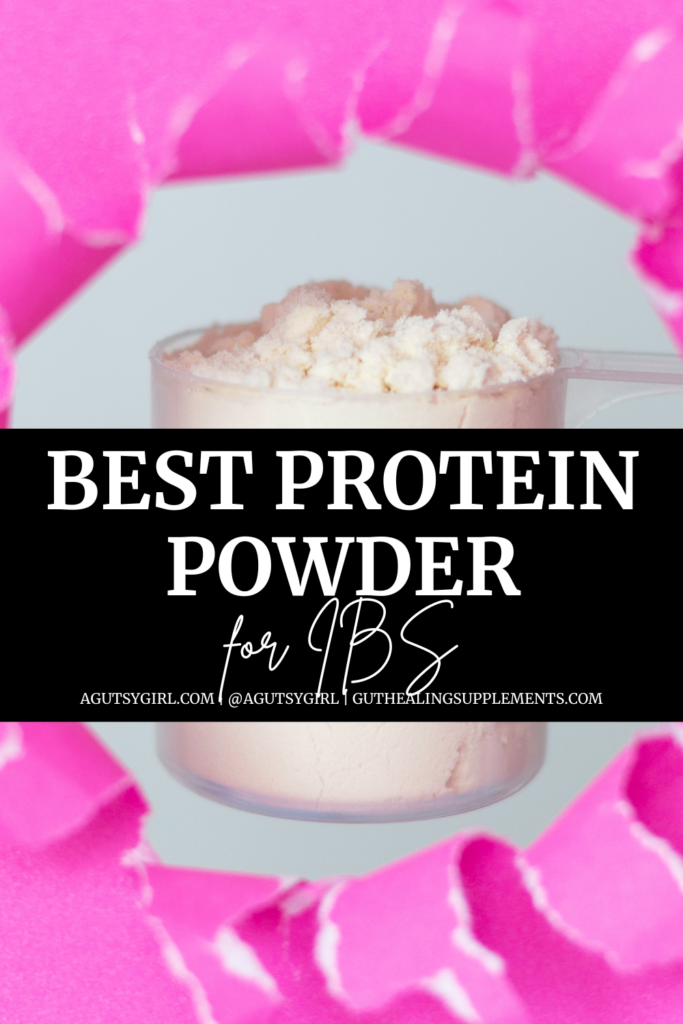
Good Alternatives
For anyone with digestive issues, it is a good idea to find the most clean and simple protein powders. This means finding high-quality protein powder that have few ingredients, are reputable, and are sourced from non-dairy products.
I also often choose a low FODMAP protein powder, meaning they do not contain sugar alcohols or carbohydrate chains that are often irritating to the digestive tract.
Some of my favorite low FODMAP choices include:
- Naked Pea Protein
- Perfect Plant Protein
- Collagen protein powder (just collagen)
All of these options have extremely clean list of ingredients and make great options for IBS patients. They limit digestive problems and contain no additional ingredients that can be inflammatory on the body.
Which one is my current favorite? A hard choice for sure.
Source: HERE
Naked Pea Protein
This one takes the cake for me in terms of natural ingredients and cleanliness (plus being marketed as a true protein powder).
It has ONE ingredient, which is almost unheard of in terms of protein powders.
The singular ingredient is pea protein isolate, which is a great source of plant-based protein.
It contains almost all of the essential amino acids, giving it a much better protein profile than most other vegan alternatives.
The brand also uses water based extraction methods, meaning they take out the risk of adding chemicals or metals into your protein powder. This ensures that you are not exposing yourself to toxins unknowingly.
Other benefits include:
- clean farming practices- lower your carbon footprint and support environmental wellness
- amino acid profile- only missing one amino acid, methionine, which can be either supplemented or found in sources such as nuts, chicken, cheese, and turkey
- equally effective as whey for building lean muscle
- can help encourage satiety and promote a better basal metabolism (also can help with weight loss but I do like to avoid that topic)
- monitored monthly by Informed Choice Trusted by Spot for filler ingredients or potential toxin exposure
In addition to all of its benefits, this pea protein powder also contains 27 grams of protein per serving. Talk about protein content!
Now, this product is UNFLAVORED, meaning you may need to add a little sweetness to whatever you put it in. I simply add some honey or a banana and boom. Done.
You can find this product HERE.
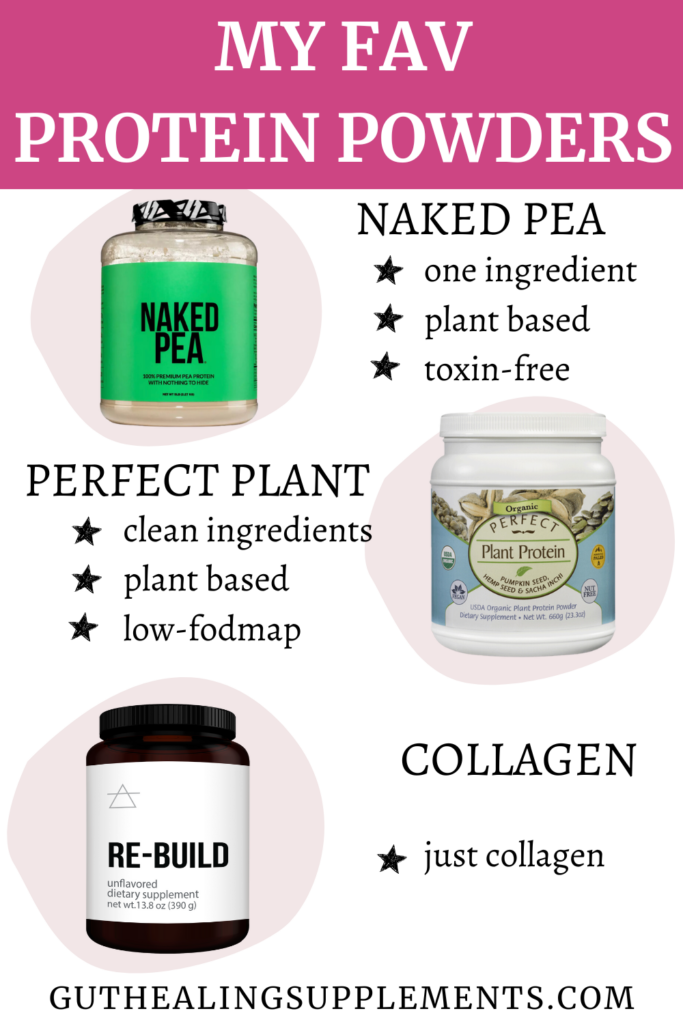
| Naked Pea Protein | Perfect Plant Protein | Re-Build Collagen |
| One ingredient: Pea protein extracted from yellow split peas grown on US and Canadian farms. | Three ingredients: Pumpkin Seed, Hemp Seed, and Sacha Inchi | Contains only a blend of collagen peptides: Verisol, Fortigel, and Fortibone |
| No added sugar | No added sugar | No added sugar, nothing else |
| 1 serving = 27g protein, 2g sugar, 2g carbs, 120 calories | 1 serving = 17g protein, 4g carbs, 118 calories | 1 serving = 11g protein, 0g carbs, 45 calories |
Benefits of Protein
Protein offers an optimal way for diversifying your gut.
The ideal situation is to incorporate plant protein throughout the day and then eat animal meat with lunch or dinner.
The combination of meat and plant protein feeds healthy bacteria and encourages a healthy gut microbiome. It also ensures that you are getting all of the necessary amino acids for your body to function at its best.
It is recommended to eat at least 30 different plants each week in order to support optimal gut health. By choosing a pea or hemp based protein powder, you already take care of one for the week!
The bottom line- it is all about diversity!
Any protein powder can work in the rotation of a balanced diet, so don’t fret about picking the exact “right” one. Just be careful about cleanliness and additional ingredients, and you should be all set!
I hope you enjoyed this discussion and let me know which protein powder you have found to work in your diet!
If you liked this post, you might also enjoy:
- Plant-Based Proteins: 6 Low FODMAP Complete Proteins for Vegetarians and Vegans
- Low FODMAP Protein Powder
- Good source of protein: 13 High Protein Broth Recipes {simple ingredients, dairy-free}
Disclosure: This is a paid, sponsored post in partnership with Naked Protein. All opinions started here are 100% my own. I appreciate your support, as this compensation helps with expenses to keep this website up and running, and for me to continue sharing all that I can with you. Some of the links in this post are affiliate links. This means if you click on the link and purchase the item, I may receive a small commission at no extra cost to you. All opinions remain my own.

Learn everything you ever wanted to know about gut health + healing your gut with the MASTER GUT HEALING RESOURCES!
Xox,
SKH
Janie Greene is

